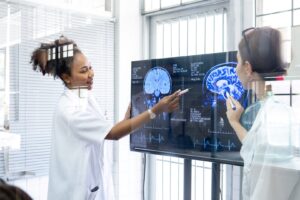
There’s no doubt about the continuous emergence of Artificial Intelligence (AI) globally, even directly impacting our lives, whether we like it or not. This has become a concern for other people, stemming from their fear of losing their job.
But in reality, AI is here to stay, as we cannot halt the continuous progress that it has been making these past years. The thing is, AI should not be our enemy; it should be our companion in delivering quintessential outputs that can be error free.
Needless to say, AI can never replace humans because, as its name suggests, it’s just “artificial.” It cannot replace human touch, empathy, critical thinking, and talent, which are crucial in some industries, like the healthcare industry.
Likewise, in recent years, the healthcare industry has witnessed a significant transformation with the integration of AI tools into various aspects of the industry, especially the emerging medical outsourcing services that have been utilized during the pandemic.
As a refresher, medical outsourcing refers to delegating certain medical functions to external service providers, which can range from administrative tasks to complex diagnostic procedures.
These advanced technologies, powered by AI, have revolutionized the way medical tasks are performed, leading to increased efficiency, accuracy, and cost-effectiveness.While also helping to improve the lives of many people.
What are these innovations? Through this article, these advances will be explored, along with the key AI tools that are being used in medical outsourcing and their impact on the healthcare sector.
AI-Powered Medical Image Analysis
One of the most prominent applications of AI in medical outsourcing is medical image analysis. It is the process of extracting relevant information from medical images to better diagnose patients and provide an earlier intervention opportunity.
Similarly, a study by Steinhubl et al. (2018) found that remote health management systems were effective in reducing hospital readmission rates for heart failure patients by providing real-time monitoring and personalized feedback.
AI algorithms can rapidly process and interpret medical images, such as X-rays, MRIs, and CT scans, with incredible accuracy. This capability streamlines the diagnostic process, enabling healthcare providers to make quicker and more informed decisions about patient care.
One of the emerging AI-tools used in this particular medical work is GI Genius, which is an AI-assisted colonoscopy tool developed to help detect polyps that may lead to colorectal cancer.
Likewise, a study by Steinhubl et al. (2018) found that remote health management systems were effective in reducing hospital readmission rates for heart failure patients by providing real-time monitoring and personalized feedback.
Natural Language Processing for Medical Transcription
Medical transcription is a critical aspect of medical outsourcing, involving the conversion of voice-recorded medical reports into written text. This is also known as natural Language Processing (NLP), which is a brand of AI that draws on linguistics, statistics, and machine learning to allow computers to understand human syntax.
With NLP-driven algorithms, AI systems can transcribe medical dictations efficiently and accurately. Obtaining meaning from a spoken or text conversation, even with all the complexities and nuances of natural language, while also gaining information from unstructured data.
This technology eliminates the need for manual transcription, reducing turnaround times and minimizing the risk of errors. This also results in preventing burnout among clinicians who swarm through all their files to encode each patient’s data, instead of actually focusing solely on attending to their patient’s needs.
Virtual Health Assistants for Patient Interaction
Virtual Health Assistants (VHA), empowered by AI-tools have transformed patient interaction and support in medical outsourcing. The integration of VHAs with existing healthcare systems has been shown to significantly improve workflows. A report by Deloitte (2020) highlighted that hospitals implementing VHAs saw a 25% reduction in administrative workload, allowing healthcare professionals to focus more on direct patient care.
With the reinforcement of Chatbots, these VHAs are more equipped, as they are also being assisted to access and analyze patient data more rapidly. These intelligent chatbots can handle patient inquiries, schedule appointments, and provide relevant medical information.
Through automating these tasks, healthcare providers and VHAs alike can focus on more complex patient care, improving overall service quality. Some of the top medical outsourcing chatbots used are One Remission, Healthily, and Ada Health.
Predictive Analytics in Medical Billing
Medical billing and coding are crucial aspects of medical outsourcing, but they can be intricate and time-consuming. AI-driven predictive analytics tools can analyze historical data to identify patterns and trends in billing, leading to optimized coding and billing practices. This not only accelerates the revenue cycle but also reduces billing errors and ensures compliance with regulatory guidelines.
AI-Enhanced Drug Discovery
The process of drug discovery is notoriously expensive and time-consuming. AI tools have come to the rescue by expediting the drug development process through data analysis and simulation.
Machine learning algorithms can analyze vast datasets to predict drug interactions, potential side effects, and efficacy, aiding in the discovery of novel medications for various medical conditions.
On the other hand, a study conducted by Byrd et al. (2021) highlighted that AI could reduce the cost and time of clinical trials by as much as 25%, with machine learning models being used to optimize patient selection and trial design.
Telemedicine and Remote Patient Monitoring
AI-powered telemedicine platforms have revolutionized medical outsourcing by facilitating remote consultations and patient monitoring. These platforms utilize AI to collect and analyze patient data, enabling healthcare providers to monitor vital signs, detect anomalies, and intervene proactively. This remote approach improves accessibility to healthcare services, particularly for patients in rural or underserved areas. Some of the most common devices used in patient monitoring are Dexcom, eCareCoordinator, Teladoc, BioButton, and the OnePulse Smartwatch.
Enhancing Medical Research with AI
Medical research requires extensive data analysis and pattern recognition, which can be laborious and time-consuming for human researchers. AI algorithms can quickly process vast amounts of medical data, identifying trends, risk factors, and potential treatment options.
This accelerates medical research and fosters breakthroughs in various fields of medicine. In fact, according to a report by Vamathevan et al. (2019), AI has the potential to reduce the financial cost of drug discovery by up to 60%, with machine learning algorithms playing a crucial role in predicting drug efficacy and safety.
AI-Driven Surgical Robotics
Incorporating AI into surgical robotics has transformed the landscape of medical outsourcing, particularly for complex surgeries. AI-driven robots can perform precise and delicate surgical procedures with unparalleled accuracy, minimizing the risk of human error. This technology has significantly improved surgical outcomes and recovery times for patients.
Moreover, A study published by Niska et al. (2020) found that AI-driven surgical robots were associated with a 21% reduction in surgical complications, emphasizing the transformative potential of this technology. In fact, the first AI-enabled surgery took place on December 22, 2022, at Ohio State University.
Conclusion
See? AI is a driving force of innovation, expanding across all industries. But like any other tool, it should not be used for greed. At the end of the day, the goal of progress is to improve lives, if AI is not doing that, then we are not using it for good.
It cannot be denied that AI tools have become indispensable in the medical outsourcing industry, as they drive innovation and efficiency in the healthcare sector.
From medical image analysis to surgical robotics, these intelligent technologies have revolutionized patient care, medical research, and administrative tasks that further assist healthcare professionals and can translate to overall excellent patient care.
As AI continues to evolve, we can expect even more groundbreaking applications in the medical field, particularly in medical outsourcing services which further enhance the quality and accessibility of healthcare services.













